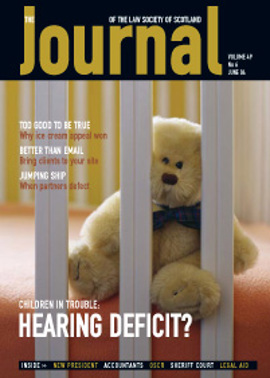Preparing to go
If you want to make God laugh, tell him your plans (Woody Allen)
If you want to retire in the next three or four years, start the planning process now. Your retirement will affect many people, apart from your family, who will be seeing much, much more of you, once you no longer have the office to escape into. Your retirement will chiefly affect your partners, your clients and your employees.
Work practices in your firm will change, relationships will change, and, particularly for those working closely with you, their entire lives will change. Your loyal secretary may even decide that she too will retire, rather than work for someone less wonderful than you (although she is not likely to climb onto your funeral pyre).
You owe it to those who work closely with you to let them know your intentions. Which means, of course, that you may as well announce your planned retirement to the world. And why not? After all, the news will leak out sooner or later and it will be better if you, rather than the office junior, have been the source of the information. Tell your staff and your partners of your plans to retire.
Your partners will need to decide how to replace your undoubted skills and astonishing capacity for hard work (although don’t be surprised if they feel that another paralegal will do the job). Finding a replacement can be a long business in some parts of the country.
Even if there is no written agreement (in which case, you will be relying on the terms of the decrepit Partnership Act) you need to discuss the terms of your departure well in advance. If you leave this discussion until the eve of your retirement party, the negotiations will be a little difficult.
Knowhow is the only asset worth anything to partners (Stephen Mayson)
If you have special knowledge, you will have to pass this on to your partners sooner rather than later. In particular, they will have to get from you the special knowledge you alone have about your most important clients. And, if you are the office expert in licensing or crofting law, a new specialist will have to be created, which can take time.
Your clients deserve to know your intentions, particularly important clients of long standing. Another partner will have to be introduced to them, preferably gradually, to ensure continuity of good service and client retention.
Money is the fuel of the business machine; yet it is extraordinary how feckless many businessmen are in their approach to it (John Harvey-Jones)
If you have substantial sums in your capital account, your partners need to find a method of repaying this to you which does not press too severely on their finances. The Partnership Act requires instantaneous repayment and written agreements often provide for repayment (with interest) over three years; but in some cases, even three years may be too short a period.
A gradual reduction of the capital sum over three or four years before retirement is sensible. If the office premises are owned by the partners, the transfer of these into a separate partnership may also reduce the capital account to a reasonable level (but check the tax position).
Unless your partnership agreement specifies that you are entitled to a pension, a consultancy fee or a payment in respect of goodwill, then you have no such entitlement. Partnership agreements rarely provide for this kind of payment, so you may need to negotiate some kind of reward for your premature departure.
Take early tax advice on your retirement to give you time to resolve any potential problems. If you anticipate receiving a lump sum from the firm, the tax consequences of this (and any alternatives) should be considered.
Absence of occupation is not rest/ A mind quite vacant is a mind distress’d (William Cowper)
Plan what you intend to do with the time released by the absence of your occupation. If you can afford not to work, make sure you have sufficient hobbies to keep your mind and body active.
Often, the retired lawyer will want to retain some connection with the profession, preferably a paying one. Will you want to be retained as a consultant by your firm? If so, what will be your duties and your remuneration?
If that is not feasible, can you work for another firm in some capacity? This may depend on your partnership agreement, of course, but much more on the terms of the unwritten agreement with your partners.
The need to plan ahead to deal with all these matters is clear, and the planning cannot start too soon. Think through what you want out of your retirement, then start to discuss it with those who will be most affected. And do it now.
In this issue
- A year full of challenge
- EU is for opportunity
- Hearing a new tale
- Ice cream verbals
- Pull together
- All change
- Partners... no more
- Death by email
- Get a service
- Preparing to go
- OSCR for directing
- Education generation
- Limits of Anderson appeals
- Through a glass less darkly
- Giving within your means
- Catching all helpers
- Scottish Solicitors' Discipline Tribunal
- Book reviews
- Mining Reports Service update
- The new law of real burdens






